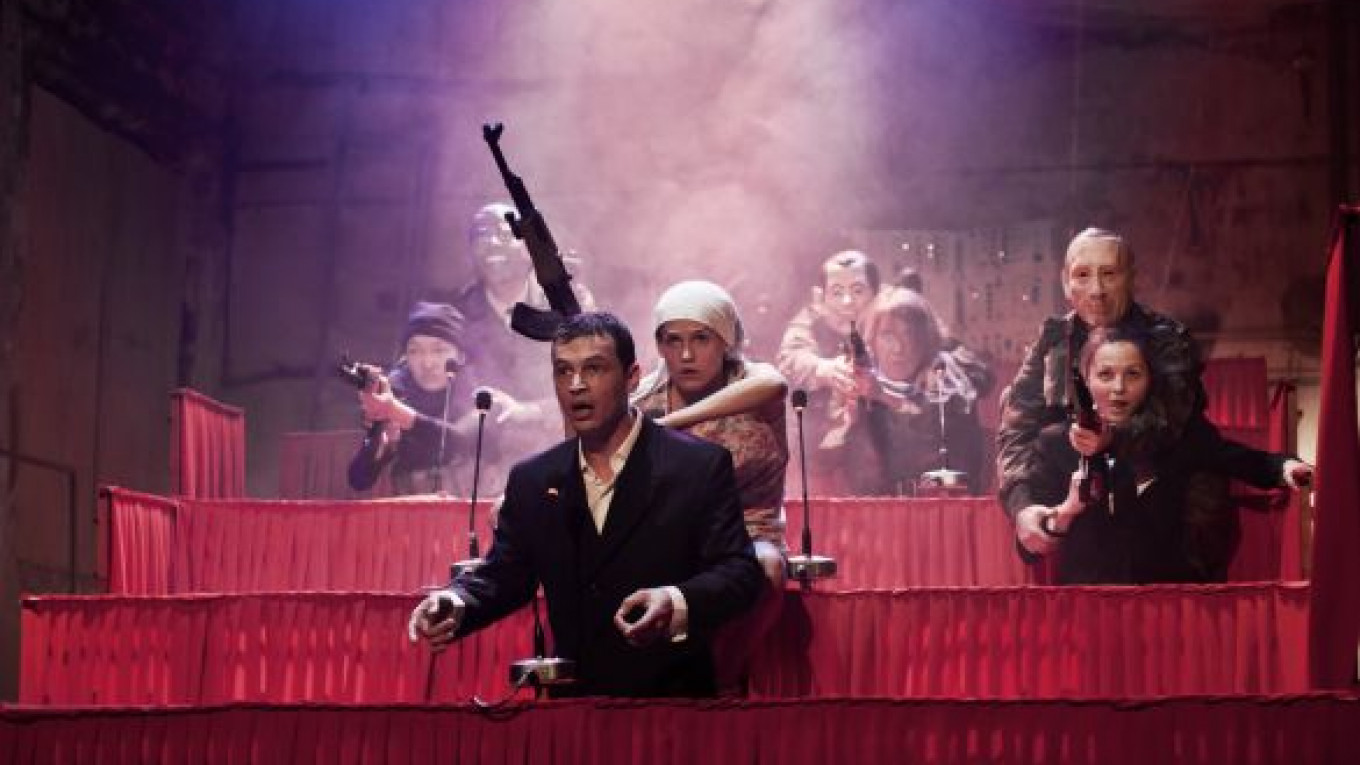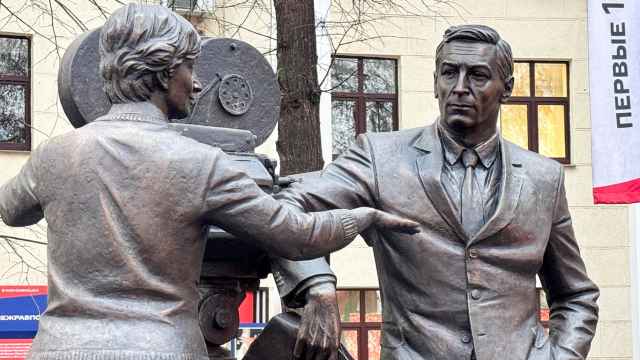If you don’t like spoilers, fold this newspaper up and don’t look at this page again until you have seen Vladimir Pankov’s production of Yury Klavdiyev’s “I Am the Machine Gunner” for the SounDrama Studio.
The fact is that this entire article is a spoiler. One word about what Pankov did with Klavdiyev’s trenchant monologue about war, identity and honor gives away the farm, the baby with the bathwater and whatever else one can give away.
I already went halfway toward spilling the beans merely by mentioning that Klavdiyev’s play is a monologue.
Now the other foot comes down: Pankov staged it using nearly a dozen actors, most of whom share bits and pieces of the text originally intended for one individual. On top of that, snippets of political speeches and news reports are spoken by figures wearing masks looking convincingly like Vladimir Putin, Barack Obama, Hillary Clinton, Yulia Tymoshenko and others.
This, in other words, is not at all what Klavdiyev wrote.
Or is it?
Klavdiyev explores the battle experiences of a grandfather who miraculously survived World War II, and his grandson who may or may not outlive the gang wars in a contemporary Russian city. The writer never gives more than hints about who is speaking at any given time.
Any director, consequently, will make different choices about how to distinguish between the play’s two voices. Is it really such a violation of the text to break it into eight or 10 voices?
I found the radical approach exhilarating.
Pankov’s production, playing at the SounDrama Studio’s new space at Project Fabrika, underscores the fact that “I Am the Machine Gunner” is emerging as one of the most important dramatic texts of recent years. Since it first appeared four years ago, it has become sharper, more timely and more revealing of contemporary Russia.
Klavdiyev’s brief text — it runs just over seven pages on my computer — achieves what many plays five times its length cannot. Employing sensitivity and insolence in equal measure, it unifies disparate generations in Russian society.
The grandfather, whose era’s greatest achievement was to emerge victorious in World War II, finds common ground with the grandson, whose peers are overwhelmed with the images and realities of deadly violence. This young man belongs to a gang battling for control of his city, but he is constantly drawn to memories of his grandfather’s decidedly unromantic, but utterly compelling, stories of war.
Here we have in a few brief pages a major attempt to cross the mutually exclusive boundaries of time, experience and history.
Klavdiyev wrote a deeply personal, highly compelling tale about two members of a family and the entirely different wars that history waged with them. Pankov exploded this into a grandiose commentary about the insidious, unspeakable effects of world politics on contemporary life.
In Pankov’s vision, the grandfather (Andrei Zavodyuk) and the grandson (Alexei Chernykh) are pawns in the games of unhinged politicians.
Putin (Pavel Akimkin) seems to give more thought to urinating than to what effect his words might have. Obama (Yevgeny Sangadzhiyev) comes across as a confused little boy caught up in a whirlwind of violence. In their midst, a “black widow” terrorist (Seseg Khapsasova) spewing “bullets” from a laser gun and haranguing us with propaganda nearly comes across as more coherent than anyone else.
It’s a fine line that Pankov walks between overkill and kitsch with images like these, but the jumbled, incoherent nature that the director attributes to politics of any kind is a central point. War is hell, and politics are dirty.
The human touch comes with Pankov’s bold choice to give an actual role to the machine gun that both grandfather and grandson use. As played by Anastasia Sychyova, this deadly tool of destruction unexpectedly acquires a tangible tenderness. Not surprisingly, it also becomes an object of sexual desire — it is both men’s link to life, as a defensive weapon, and to the death they wreak on others and call upon themselves.
The sound design overseen by Alexander Pleninger combines haunting, disconcerting waves of electronic sound interweaving with the rhythmic plunking of balalaikas. Designer Maxim Obrezkov set the action in and around a red-festooned dais that seems a fair copy of the place where the Supreme Soviet used to meet in the Soviet era.
“I Am the Machine Gunner” is a bold reinterpretation of a play that is becoming a modern classic. Miss it at your own risk.
“I Am the Machine Gunner” (Ya, Pulemyotchik), a production of the SounDrama Studio, plays Oct. 3 and 25 at 8 p.m. at Project Fabrika, located at 18 Perevedenovsky Pereulok. Metro Baumanskaya. Tel. 600-6992. Running time: 1 hour, 20 minutes.
A Message from The Moscow Times:
Dear readers,
We are facing unprecedented challenges. Russia's Prosecutor General's Office has designated The Moscow Times as an "undesirable" organization, criminalizing our work and putting our staff at risk of prosecution. This follows our earlier unjust labeling as a "foreign agent."
These actions are direct attempts to silence independent journalism in Russia. The authorities claim our work "discredits the decisions of the Russian leadership." We see things differently: we strive to provide accurate, unbiased reporting on Russia.
We, the journalists of The Moscow Times, refuse to be silenced. But to continue our work, we need your help.
Your support, no matter how small, makes a world of difference. If you can, please support us monthly starting from just $2. It's quick to set up, and every contribution makes a significant impact.
By supporting The Moscow Times, you're defending open, independent journalism in the face of repression. Thank you for standing with us.
Remind me later.







